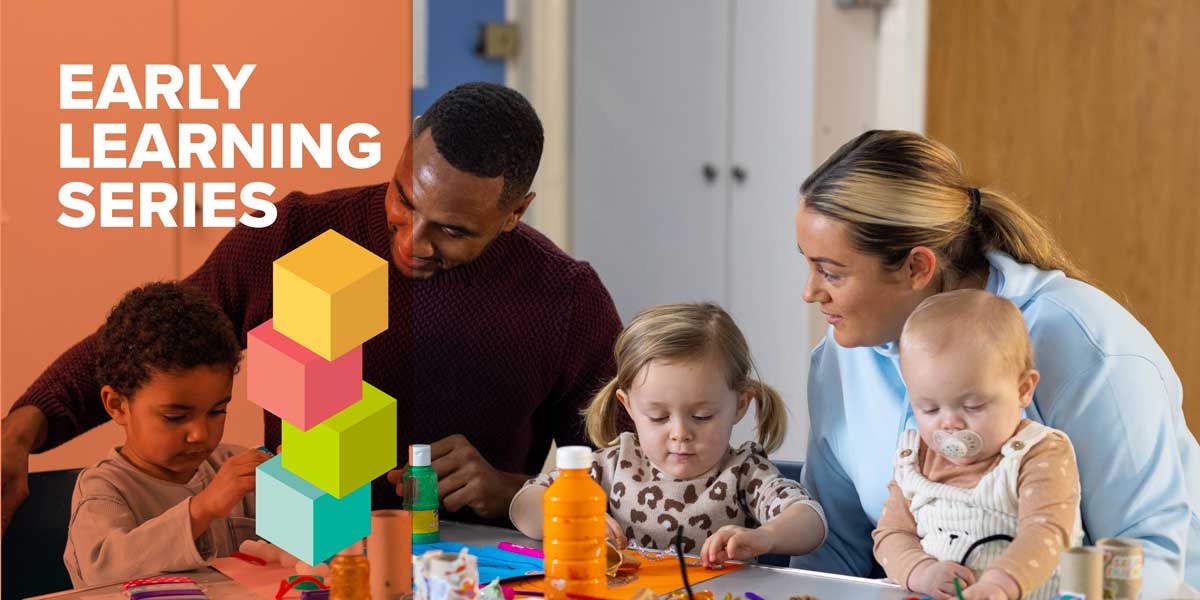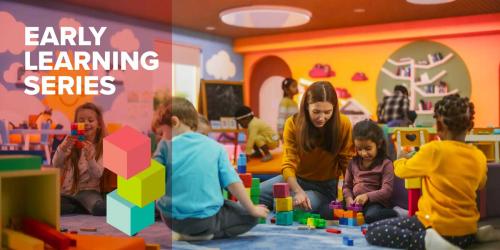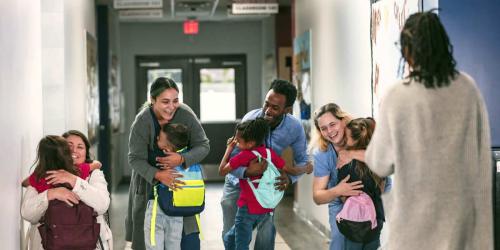Beyond Open House: Redefining Family Engagement in Early Learning

Family engagement is not just about welcoming families into a classroom—it’s about reshaping the narrative of school, family, and community into something reciprocal, inclusive, and deeply human.
We spoke with Lindsay Camp, lead teacher at Kodiak Cubs Preschool (part of the Cascade School District in Leavenworth, Washington), about her approach to engaging families of young learners.
Start With Enthusiasm, Lead With Heart
When a child enters a new learning space, so does their family. The first interaction sets the tone, whether it happens in person, on the phone, via text, or on social media.
Lindsay explained, “I have to convey my enthusiasm and excitement about their child participating in my program—and their entire family participating.”
She sees herself not as the expert to whom families hand off their children, but as a partner in a shared project: nurturing a child’s development.
“I’m a valuable team member in their family,” she said. “We’re in this together.”
Rewriting the Narrative of School
Many families come with complex histories—some marked by trauma, exclusion, or anxiety about school. Lindsay’s approach is to meet families exactly where they are.
“I say, ‘You’re making a different choice for your child right now. That’s amazing. You’re already doing something powerful.’”
She recognizes every caregiver’s humanity and affirms their worth so they feel like a valued partner in the learning space.
“Raising young children is hard. It’s lonely. It’s stressful. And when I meet families at that moment, my role is to be a catalyst for change, to support the work they’re already doing—not to take over, but to come alongside.”
When I meet families at that moment, my role is to be a catalyst for change, to support the work they’re already doing—not to take over, but to come alongside.
Engage the Whole Family and Meet Them Where They Are
True family engagement means welcoming everyone—grandparents, older siblings, aunts, uncles, chosen family—and creating a space where their presence is valued.
For Lindsay, family engagement also means recognizing barriers and building systems to reduce them. That means multilingual communication (English, Spanish, Russian, and more), accessible formats, and outreach in community spaces: the local library, grocery store bulletin board, farmers market, or laundromat.
“We don’t wait for families to come to us,” said Lindsay. “We go to where they are.”
Family Engagement ≠ Family Participation
One of Lindsay’s most critical insights? Family engagement does not mean physical participation. She noted that engagement means valuing education, being in communication, making decisions for your child, and feeling empowered to speak up.
“You can be a fully engaged family and never attend a single school function,” she explained. “Families work. Families are tired. Families do what they can. We need to stop equating engagement with showing up physically.”
Choice, Dignity, and Respect
From the beginning, Lindsay’s program offers choices to families: not only which preschool their child attends, but also class times, learning models, and how they participate. The preschool collaborates with other providers to make sure families know they have options.
Lindsay added, “We say, ‘Whatever works best for your family is what we want for you.’”
This philosophy removes guilt, fosters empowerment, and reframes educators as allies in a family’s journey.
Orientation, Not Just Open House
Instead of an open house, Lindsay’s program invites families to a warm and welcoming orientation. They tour the classroom, meet the teacher, see the bathroom (a top request!), and begin the year feeling known and safe. Lindsay focuses on not only logistics but also building trust and relationships.
“We’re not trying to be your family,” said Lindsay. “But we want you and your child to feel loved, cared for, and supported here.”
Small Communities, Big Impact
Lindsay noted that many years working in a small rural community has led to deep, intergenerational connections. She now sees the children of her former students walk through her door.
“I know the librarians, the hospital administrator, the grocery clerk,” said Lindsay. “Those relationships help me serve families better, share resources more efficiently, and feel rooted.”
In small communities, institutional knowledge is gold. Preserving it through relationships ensures sustainability and growth.
The Long View: A Shift in Practice and Philosophy
When asked how family engagement has impacted her program, Lindsay did not hesitate: “It’s changed everything. When I started teaching, I thought my job was to teach academic content. Now I know that supporting families is the foundation for everything we do.”
When I started teaching, I thought my job was to teach academic content. Now I know that supporting families is the foundation for everything we do.
And the results are showing. Her students grow academically and emotionally. Families build stronger ties to education. And former students return as teachers, librarians, and community members.
“That shift has given me purpose and longevity in this career,” said Lindsay. “It keeps me coming back—even when things are hard.”
Family Engagement Lessons From Lindsay
- Lead with purpose. Know your “why” and build everything from there.
- Be visibly enthusiastic. Your energy can change a family’s relationship with school.
- Meet families where they are. Physically, culturally, and emotionally.
- Build systems that support, and do not burden, families. Accessible communication matters.
- Honor all forms of engagement. Participation looks different in every home.
- Uplift family voices. Make space for shared leadership.
- Lean on community partners. Libraries, grocery stores, and family coordinators all have a role.
If we want to create learning environments where children thrive, we must first create spaces where families are truly seen, respected, and celebrated. As Lindsay reminds us: “All families are different families. And they all want the best for their children.”
Vicki Nishioka was a managing researcher at Education Northwest. She has extensive research and professional development experience in early learning, school climate and discipline, community and school-based mental health services, civil rights, special education, alternative education, and Positive Behavior Interventions and Support.



